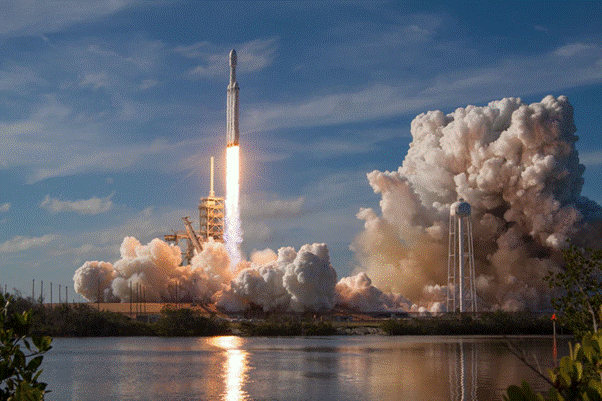Whilst on virtual work experience Angus MacKenna, Year 12 student from The Leys School, Cambridge chose to research his topic of passion, being SPACE.

Space travel has existed for over 60 years now, and as we develop more efficient and enhanced technology, our capabilities grow. What started off as a concept has now become an accepted reality. However, the next step of affordable commercial space travel is still a long way away, with the spare seat on Jeff Bezos’ ‘Blue Origin’ having gone for $28 million, a price very few can pay. Yet, if it were affordable, would it be acceptable in its current state?
Space exploration started in 1957 when the Soviets launched the first artificial satellite, Sputnik 1, into space. Four years later on April 12, 1961, Russian Lt. Yuri Gagarin became the first human to orbit Earth in Vostok 1. However, advancements in launching these rockets have been minimal and therefore the fuels used are terrible for the environment. Each kilogram (KG) of rocket fuel releases 3 KG of CO2 meaning each launch releases 336,552 KG of CO2. A flight from London to New York City has a carbon footprint of 986 KG highlighting that the rocket launch is considerably worse (as expected) meaning if they were to be repeated, or become anywhere close to the frequency of plane journeys, the world would suffer irreversible damage and global warming would be considerably worse.
That is not to say there are not solutions, the market for environmentally friendly products is larger than ever and is growing at a rapid rate, so by the time we have managed to combat the cost issue with commercial space travel, we will likely have grasped the environmental side too. The longer we wait the smaller the reachable universe is according to the theory of relativity, meaning the chance that space travel will be used to get to another inhabitable planet is also decreasing. This could result in space travel either be used for leisure purposes or to access planets such as Mars which may be inhabitable by then. Raising the question whether we would destroy other potential inhabitable planets, in the way we are currently and regrettably destroying planet earth.
Should it be right for us to expand our reach if we are only going to use it for a relatively short period, and then leave it in a far worse state than we found it? These pose ethical questions that are not a simple yes or no, but need to be seriously considered before any progression should be allowed to take place.
I am very optimistic about the future of space exploration and travel and find it fascinating but would not like to support something that could cause more harm than good. The future of space exploration and travel is bright and solutions will undoubtedly be found, not least due to the large funding it receives as a sector, with NASA alone getting $22.6 billion from the US government in 2020. In the last 50 years very little progress has been made in getting humans past the LEO (Low Earth Orbit) and that begs the question, could that money be used for far better causes in society? For instance, helping to combat climate change or homelessness etc. Furthermore, as private companies pour more money and efforts into the Space sector, is it necessary to fund them though the Government? The UK Space agency is given £469 million, nowhere near the US’ number. A more sensible funding in my opinion, especially with so many private companies like SpaceX, Blue Origin and Virgin Galactic who all have far deeper pockets. That is why I do not deem commercial space travel to be entirely ethical, however in time once these major issues are solved, I think it should be something to look favourably on, as opportunities for mankind become limitless.
Angus MacKenna, The Leys School, Cambridge
Sources:
https://www.forbesindia.com/article/forbes-lifes/28-million-thats-how-much-a-seat-to-space-with-jeff-bezos-costs/68525/1
https://www.treehugger.com/spacex-launch-puts-out-much-co-flying-people-across-atlantic-4857958
https://aerospace.org/article/brief-history-space-exploration
https://en.wikipedia.org/wiki/Budget_of_NASA#:~:text=Annual%20budget,-NASA's%20budget%20as&text=NASA's%20budget%20for%20financial%20year,in%20nominal%20dollars)%20on%20NASA.